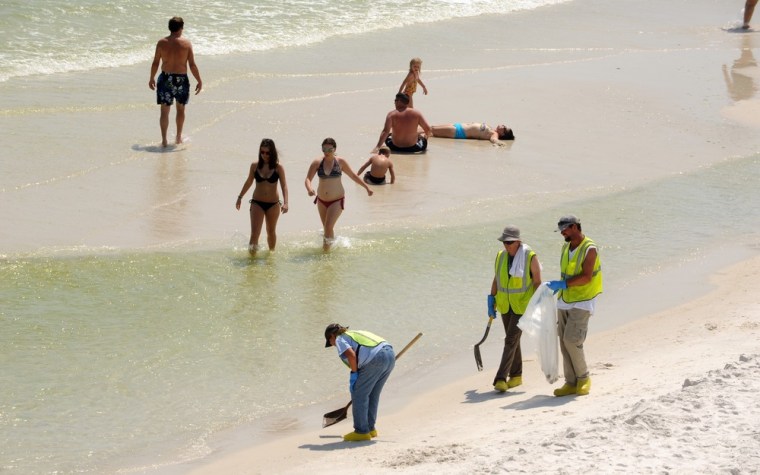For decades, billions poured into Gulf Coast states that allowed oil drilling off their shores. Economies grew, jobs were created and millionaires were born all along the waterfront. Everywhere, that is, except Florida.
People of all political stripes largely banded together in the Sunshine State, united in opposition to offshore drilling and confident the peninsula's $61 billion tourist-driven economy hinged on a pristine environment. Fearing the doomsday an accident could bring — or simply the sight of rigs from beaches — Florida rejected drilling.
But doomsday came anyway.
As Floridians see their white sand beaches getting fouled by the spill, many are angry at their Gulf Coast neighbors.
"They don't have a leg to stand on when it comes to crying about the oil," said Gregg Hall, a 48-year-old Pensacola Beach resident who walks the shore daily looking for signs of the spill's impact. "They contributed to it."
Resentment is brewing in the Florida Panhandle over slumping tourist dollars, a fishing industry that has been hamstrung, and the possibility of plunging property values. And while much of it is aimed at BP and the government, there is recognition that the decisions made by neighboring states have hurt Florida.
"I love Alabama and Mississippi and Louisiana, but it's Florida first for me," said Gov. Charlie Crist, who has ordered a special legislative session to consider a constitutional amendment that would let voters decide whether to permanently ban offshore drilling in state waters. "Here is the single loudest wake-up call ever as to why we've done that in Florida: Because it is not risk free."
'We don't do this stuff'
Grover Robinson, a commissioner in Escambia County, home to Pensacola, said Florida should get any aid first because it had no role in the catastrophe.
"I know we're all in it together," he said. "But Florida's injuries are greater because we don't do this stuff."
All the other Gulf Coast states — Alabama, Mississippi, Louisiana and Texas — have drilling operations off their coasts. Louisiana, which produces the vast majority of oil in the Gulf, has allowed drilling since 1947.
"They made that decision to do what they've done over the years," said P.C. Wu, a city councilman in Pensacola, where oil has washed onto the beaches, causing some tourists to flee. "What's happened here is going to cost a lot of money but it's something that we were completely opposed to."
Tourism is Florida's top industry, drawing about 81 million visitors a year, employing more than 1 million people and accounting for 21 percent of sales tax revenues in a state that has no income tax.
Beaches in the Florida Panhandle, the only ones so far affected by the spill, have long drawn visitors to their sugary white sands.
Tourism is important to the other Gulf states hit by the spill, but it's not the dominant industry as it is in Florida. Alabama, Mississippi and Louisiana drew a combined 63 million tourists last year, according to state figures, generating $23.2 billion in spending.
State and federal laws govern who controls different parts of the Gulf. In general, Louisiana, Mississippi and Alabama control an area extending about 3.5 miles off their shores while Texas and Florida claim about 10.4 miles off their coastlines.
In Florida, some companies had leases to drill off the Panhandle before a 1981 federal moratorium on new offshore drilling. They were grandfathered in and continued their activity off and on into the early 1990s.
But by and large, Florida's leaders have stood against drilling in the last several decades, regardless of their political party affiliation.
"People really value our beaches and our coastal economy," said Eric Draper, executive director of Audubon of Florida. "It just was considered a mandatory for political leadership here to be against oil drilling off Florida's coast."
That began to change two years ago as gas prices reached $4 a gallon. Crist, who in his 2006 gubernatorial run opposed any drilling off the coast, said in 2008 he was more open to the idea as he campaigned with the Republican presidential nominee, Sen. John McCain. A year later, he shifted even further, saying he was "open minded" about a bill that would have allowed rigs within a few miles of beaches.
But then the Deepwater Horizon explosion happened April 20. Now, Crist wants a permanent ban on offshore drilling in the state.
Florida's long-standing wariness of offshore drilling has allowed a feeling of martyrdom to creep in to this state where, in hindsight, the decision to keep oil rigs away from the shoreline seems pretty smart.
"When something goes wrong with one of those oil rigs it doesn't just affect those states that have basically been selling out to the oil industry," said Kenneth Welch, a commissioner in Pinellas County, farther south along the Gulf Coast on the Tampa Bay. "We won't know for years, I think, what the real impact is, not only to tourism and to our tourism-based economy, but the impact of a million gallons of dispersant."
Dave Rauschkolb founded the anti-drilling group Hands Across The Sand after the issue came up in the state Legislature. He owns three Panhandle restaurants along the beach, is a lifelong surfer and an avid fisherman. The decisions of other Gulf states, he says, are motivated by money, but have a far wider effect.
"There are some things that we need to see not only in economic terms. The soul of America is being lost because of things being seen only in economic terms," he said. "They'd have to be blind and deaf to not see how their actions affect the other Gulf states."
